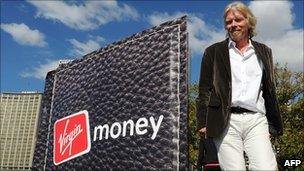Virgin Money looks to join the mainstream
- Published

Unlike some Virgin-branded companies, Richard Branson owns a large stake in Virgin Money
Following the deal to buy Northern Rock, Virgin will soon be able to add High Street banks to the seemingly endless list of products and services under its ubiquitous brand.
Encompassing holidays and gyms, trains and planes, mobile phones and music festivals, the Virgin brand is everywhere.
But not everything Richard Branson touches turns to gold.
His great skill, analysts say, has been knowing when to sell and how to extract the best possible price for his assets.
There have been exceptions. Although the Virgin empire began with a chain of record shops in the 1970s, Mr Branson ended up selling Virgin Megastores in 2007 for just £1.
But even projects that have proved less than successful, such as the Virgin Brides wedding dress business that closed in 2007, have failed to dent the brand's seemingly impregnable aura.
"Virgin still has a huge pull with consumers and is still considered to represent good customer service," says Rich Sutcliffe, editor of Brand Republic.
By extension, this makes the brand attractive to businesses. Mr Sutcliffe cites NTL's rebranding as Virgin Media, also in 2007, which allowed the company to increase its advertising revenues considerably.
The key to the brand's success is simple, says Mr Sutcliffe: Richard Branson.
"He is undeniably one of the most charismatic and successful business entrepreneurs [in the UK]."
US backing
Northern Rock should, then, benefit from the Virgin brand, and there can be little doubt about Mr Branson's personal interest in the financial arm of the business.
In 2004, he invested £90m to gain 100% ownership, unlike some Virgin-branded companies that do little more than license the name.
In 2010, Virgin sold a 21% stake in its financial arm for $100m to US billionaire Wilbur Ross, who has made much of his money investing in distressed assets.
Indeed, the acquisition of Northern Rock is in part being funded by Mr Ross, who bought his stake in Virgin Money precisely to take advantage of what he saw as cheap UK banking assets following the financial crisis.
Both parties will be determined to make Virgin a success in the banking world.
Slow start
But just how much value the Virgin brand will offer remains to be seen. A holiday or mobile phone contract is one thing, but hard-earned savings is quite another.
Virgin has the track record in financial services to suggest it is here to stay, unlike some other Virgin-branded services, but its slow growth to date suggests the brand has, so far, been of limited value.
The company started life as Virgin Direct in 1995 with its first Personal Equity Plan, the forerunner of Individual Savings Accounts, the tax-free savings and investment plans.
It added credit cards and personal loans in 2002, car and home insurance in 2004 and life insurance a year later. Only in 2010, with the acquisition of Church House Trust, did it finally acquire a banking licence.
The company is best known within the industry for its competitive credit cards, according to David Black at financial research group Defaqto.
And while it offers current account mortgages, these are currently operated through a third party.
Its investment products have also fallen behind the competition, according to Adrian Lowcock at independent financial adviser Bestinvest.
Despite aggressive marketing, Virgin's pooled investment products are looking "a little dated and expensive", he says.
Despite its three million customers, then, Virgin Money has remained on the edges of mainstream banking.
'Fresh ideas'
But that could be about to change with the buyout of Northern Rock.
"The deal is quite transformational for Virgin Money, as it moves from a comparatively small online offering to a High Street banking presence," says Mr Lowcock.
The company will remain a bit-part player for the foreseeable future - it is only taking on 75 Northern Rock branches, after which it will be about one-10th the size of the big four UK banks it will be competing against.
But what it will hope to do, in the words of Mr Branson, is bring some "fresh ideas and an injection of new competition" into UK banking.
Whether it succeeds only time will tell. As Mr Lowcock says: "Virgin Money set out to shake up the financial services market [in 1995], but it hasn't really done that."
By definition, however, it cannot fail to offer more competition, which can only benefit consumers in the long run.
- Published17 November 2011